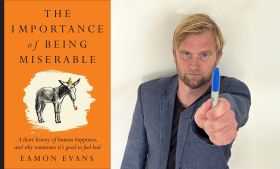Australian arts workers can benefit from life and income insurance to protect themselves and their families.
We insure our cars, our homes, our computers and even our pets, so why don’t Australian workers put the same effort into insuring our lives and incomes?
Most people don’t like to think about what could happen if they, or a family member, die, have an accident, develop a terminal illness or are left unable to work for the rest of their lives – but the cruel reality is that it happens and, if it does, you still have to pay the bills.
Not having any insurance or being under-insured can have dire consequences for arts workers, who rarely have the security of extensive savings.
‘The ramifications for being under-insured are that at some stage in the future you will run out of money and you’ll have to find other means of surviving,’ said Michael Rooney, Deputy CEO of industry superannuation fund, Media Super.
‘If you die, your family that are left often can’t afford the mortgage or schooling for children.
‘A number of people also end up being forced back into work prematurely because they ran out of money from their insured benefit because they didn’t insure for enough.’
The Underinsurance in Australia Report 2014 released by Rice Warner revealed a middle-income Australian family with two children needs $680,000 in life insurance. Currently, the median level of life insurance is less than half that – $258,000 – which is not enough to meet basic needs.
Rooney says people start to think about insurance when something unthinkable happens to a colleague, family member or friend.
‘People figure they will be here for a long time and unless they have had a tragedy in their life, they tend not to want to talk about it too much,’ he said. ‘It’s most common for a member to become very interested in income protection because someone at work has been injured in a car accident or somewhere else, or has become ill and suddenly their income stops and they think, what if that happens to me?’
What does this kind of insurance look like?
Media Super offers three main types of insurance: Death, Total and Permanent Disablement (TPD) and Income Protection.
The first is a lump sum payment designed to either help your family cover the costs of your financial obligations after your death – the mortgage, kids’ school fees and living expenses. TPD is also a lump sum, but it will also likely be used to replace your lost future income and cover medical expenses.
The third is a regular payment system to cover your income for up to five years should you become ill or injured and unable to work. This policy also includes superannuation contributions so your retirement savings won’t suffer.

There are three types of insurance to protect your life and income: Death, Total and Permanent Disablement (TPD) and Income Protection.
Rooney said most people opt for these kinds of policies through their super fund and, especially for workers in the arts, a fund such as Media Super tailors specifically for that industry.
‘A lot of our members are artists and actors and entertainers,’ he said. ‘A number of other super funds don’t cover those kinds of professions. If they were to try and go out and get an individual policy they would struggle, especially if they were a freelancer and not getting a regular income.’
Buying insurance policies through a super fund can also be cost-effective and convenient because members can pay premiums from their superannuation funds.
So how much insurance is enough?
Rooney says it’s not a one-size-fits-all approach.
‘People don’t know how much they would need for the next 15-20 years if they had to stop working tomorrow,’ he said.
Rooney and his team highly recommend that each member seeks expert financial advice before locking in any insurance policies.
‘We believe it’s important to speak to a financial planner to help you work out what’s right for you,’ he said. ‘Everyone’s circumstances are different – whether you have a mortgage, if you rent, if you have five children or none, if you’re in a relationship, and it’s the same with income.’
Media Super offers several levels of professional assistance. Its business development managers can provide general advice about the company’s products, while its helpline advisers* offer limited personal advice about contribution strategies, investment options and insurance over the phone.
Its financial planners# can provide more complex advice about superannuation, retirement planning and your broader financial situation. Your first one-hour consultation is at no cost and you’ll be provided with quote based on an hourly charge if you require further advice.
When you join Media Super, eligible members are automatically covered under what it calls a default system for Death and TPD insurance. This is essentially a basic level of cost and cover based on your age. You may also be eligible for automatic Income Protection.
Unless you alter the level of cover, you will remain on the default level. Media Super has worked out a sliding scale of benefit based on the assumption that you will earn more as you get older and that you’ll also have more financial commitments.
So each policy increases in cost as you age – but the benefit you receive increases too.
The problem is that members rarely review their insurance needs – 90 percent are still on the default level.
‘They look at it and say, oh that’s nice I have $200,000 worth of insurance and off they go,’ Rooney said.
Regularly reviewing your insurance needs, especially if you get a pay rise or your financial commitments increase, is key.
Insurance is not just for full-time staff
Rooney says it’s a mistake for anyone to think that, just because they don’t have a full-time job that they aren’t eligible for any type of insurance – especially income protection.
‘A lot of places won’t insure freelancers or provide very limited cover so we have designed our cover to ensure freelancers can get coverage,’ he said.
‘It is more important for freelancers to speak to a financial planner to get it right because their income won’t be regular – they will get a lot of money in some periods and then less money in others.
‘Freelancers are generally running a business, so it’s not a set salary like a lot of employees get, so a financial planner can look at their position and how their business works and what their cashflow is to ensure they have the appropriate cover especially on the income protection side.’
Find out more about insurance through your super or give Media Super a call on 1800 640 886 to talk through your insurance needs.
*Helpline Consultants and Helpline Advisers providing general or limited advice are representatives of Mercer Outsourcing Australia Pty Ltd (MOAPL) ABN83 068 908 912, AFS Licence 411980.
#Media Super has engaged Industry Fund Services (IFS) ABN 54 007 016 195 AFSL No 232514 to facilitate the provision of financial advice to members of Media Super. Advice is provided by one of our Financial Planners who are Representatives of IFS. Fees may apply. Further information about the cost of advice is set out in the relevant Financial Services Guide, a copy of which can be obtained by calling IFS on 1300 138 848. IFS is responsible for any personal advice given to you by its Representatives.
This article provides general information only, and does not take into consideration your personal objectives, situation or needs. Before making a decision to combine your superannuation, you should consider any penalties such as exit fees, change to insurance cover or loss of benefits that may apply and, if necessary, consult a qualified financial adviser. Before making any financial decisions you should first determine whether the information is appropriate for you by reading the relevant Product Disclosure Statement and/or by consulting a qualified financial adviser. Issued by Media Super Limited (ABN 30 059 502 948, AFSL 230254) as Trustee of Media Super (ABN 42 574 421 650).






